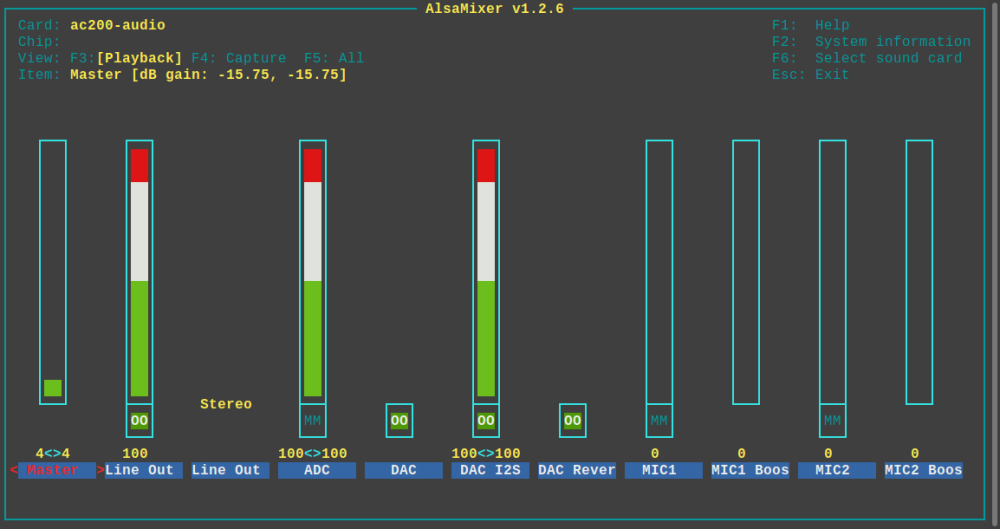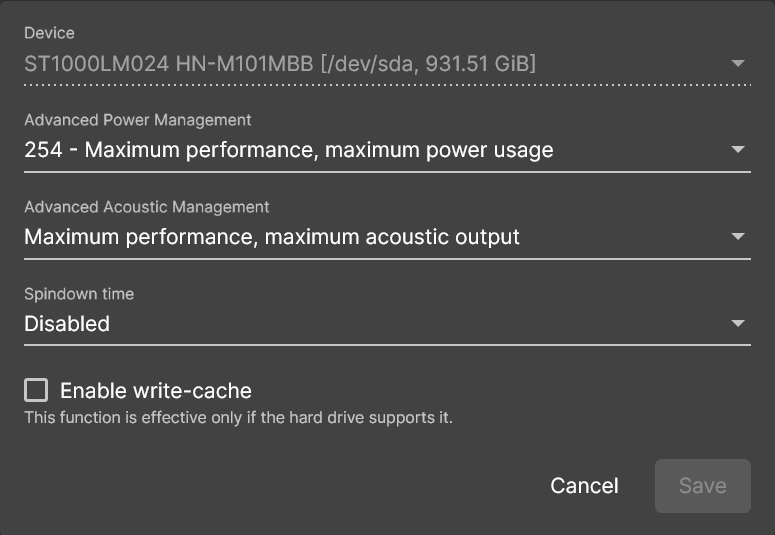Search the Community
Showing results for tags 'orangepi3-lts'.
-
Hi! Is the Orange Pi3 image suitable for the Orange Pi3 LTs? Or where to find it?
-
Hello. Sorry for my english. I have OrangePi3 LTS and BTT TFT35 SPI v2.1 with ili9488. I am trying to connect display to orangepi via SPI, but I dont have ili9488 driver in fbtft folder. When I am building fbtft with ili9488 from github https://github.com/Snitro/fbtft-ili9488, I am getting error. What did I wrong? uname -a : Linux orangepi3-lts 6.6.31-current-sunxi64 FBTFT Build error: root@orangepi3-lts:/lib/modules/6.6.31-current-sunxi64/build/drivers/video/fbdev# make -C /lib/modules/`uname -r`/build M=$PWD modules make: Entering directory '/usr/src/linux-headers-6.6.31-current-sunxi64' CC [M] /lib/modules/6.6.31-current-sunxi64/build/drivers/video/fbdev/fbtft-ili9488/fbtft-core.o /lib/modules/6.6.31-current-sunxi64/build/drivers/video/fbdev/fbtft-ili9488/fbtft-core.c: In function ‘fbtft_framebuffer_alloc’: /lib/modules/6.6.31-current-sunxi64/build/drivers/video/fbdev/fbtft-ili9488/fbtft-core.c:694:36: error: ‘FBINFO_FLAG_DEFAULT’ undeclared (first use in this function); did you mean ‘FAULT_FLAG_DEFAULT’? 694 | info->flags = FBINFO_FLAG_DEFAULT | FBINFO_VIRTFB; | ^~~~~~~~~~~~~~~~~~~ | FAULT_FLAG_DEFAULT /lib/modules/6.6.31-current-sunxi64/build/drivers/video/fbdev/fbtft-ili9488/fbtft-core.c:694:36: note: each undeclared identifier is reported only once for each function it appears in make[3]: *** [scripts/Makefile.build:243: /lib/modules/6.6.31-current-sunxi64/build/drivers/video/fbdev/fbtft-ili9488/fbtft-core.o] Error 1 make[2]: *** [scripts/Makefile.build:480: /lib/modules/6.6.31-current-sunxi64/build/drivers/video/fbdev/fbtft-ili9488] Error 2 make[1]: *** [/usr/src/linux-headers-6.6.31-current-sunxi64/Makefile:1915: /lib/modules/6.6.31-current-sunxi64/build/drivers/video/fbdev] Error 2 make: *** [Makefile:234: __sub-make] Error 2 make: Leaving directory '/usr/src/linux-headers-6.6.31-current-sunxi64'
-
Hi I've got both left and right channels working of my analog audio jack. The quality is quite good as long as Master audio isn't set above volume 15 - 20 or so. Toggling DAC or DAC-Reversed in Alsamixer will enable or disable the physical left and right physical speakers of ear buds. However! On both channels, the left and right software signals are mixed. So if I use "aplay stereo-file.wav", I hear left+right mixed through my separate left ear. Listening to my right earbud, same story: I hear left+right audio mixed. Please help, I can't even find any snd_ module flags to mess with. I've no pulseaudio installed on this latest stable server edition of Armbian (Armbian_23.8.3_Orangepi3-lts_jammy_current_6.1.53_minimal.img). Armbianmonitor txt/gzip output is attached. root@oranger:/etc/modprobe.d# lsmod | grep -i snd snd_soc_hdmi_codec 20480 1 snd_soc_ac200 32768 1 snd_soc_simple_card 20480 0 snd_soc_simple_card_utils 24576 1 snd_soc_simple_card root@oranger:/etc/modprobe.d# modinfo snd_soc_ac200 filename: /lib/modules/6.6.16-current-sunxi64/kernel/sound/soc/codecs/snd-soc-ac200.ko license: GPL author: Jernej Skrabec <jernej.skrabec@gmail.com> description: X-Powers AC200 Codec Driver alias: of:N*T*Cx-powers,ac200-codecC* alias: of:N*T*Cx-powers,ac200-codec depends: intree: Y name: snd_soc_ac200 vermagic: 6.6.16-current-sunxi64 SMP mod_unload aarch64 root@oranger:/etc/modprobe.d# uname -a Linux oranger 6.6.16-current-sunxi64 #2 SMP Fri Feb 23 08:25:28 UTC 2024 aarch64 aarch64 aarch64 GNU/Linux armbianmonitor-output.txt.gz
-
I updated my system to the newest kernel and lost all WiFi. What is the deal???
-
I have a orange pi3 lts. I tried to install either minimal ether gnome version. Wireless is configured and working . I tried to execute command sudo systemctl enable ssh and reboot but sshd is down always and screen show always desktop orange PI without any network connection. I tried to use also u armbian-config but ssh is always down and network is down . Any attempts is not working . In addition thr desktop interface is the same in minimal and gnome version .... very strange
-
After an "apt upgrade", the kernel was switched to "Linux 6.6.16-current-sunxi64" (Armbian 24.2.1 Jammy). On the WiFi side, no problem, but for Ethernet, it no longer seems to detect the link. So I downgraded to "Linux 6.1.77-legacy-sunxi64" with armbian-config. After this, the Ethernet works again. Do you have any idea where this could come from? And if this can be fixed in future versions?
-

Is it possible to play videos with Kodi on Orange Pi 3 LTS ?
gop3k posted a topic in Allwinner sunxi
Hello, sorry for the dumb questions incoming, thanks for your time. Lately I spent a lot of time searching for a working image to run Kodi with wifi/ethernet/bluetooh on this board. Does anybody managed to play videos on Kodi on this SBC ? If yes, what armbian image should I choose for this purpose ? Do I have to build the image myself ? Tested LibreElec for this but no wifi because the drivers are out-of-the-tree, not in mainline Kernel. Read about my problem in many posts but didn't find what I was searching for... Not even sure if this SBC can be used as a linux media player. Any tip/link/guide/wiki on how to successfully install kodi/hardware acceleration/video decoding/needed drivers for this board will be much appreciated. -
As the title says. I can not get PWM to work. I can type gpio mode 2 pwm and no error. But when I try to access it from Klipper (3D Printer Software and Firmware) it won't work. However if I use gpio 3, in software, gpio 4 turns on. Please help me out here. Thanks, Kevin
-
Hello, I have Orange Pi 3 LTS with Armbian 22.*.1 5.15.80-sunxi64. It have been working well for about a year, but after upgrading to 23.8.16.1.47-current-sunxi64 network interfaces stop working at all. I can't downgrade kernel with arbian-config because it need internet access. Here is output from armbianmonitor: armbianmonitor.txt Could you please guide me how to solve this issue?
-
Hello everyone, I encountered an issue while using SPI with my Orange Pi 3 LTS, and now I'm going to share some solutions. Perhaps the Armbian Team can assist me in resolving the final problem. These tests were conducted on Armbian 23.02.2 Bullseye with Linux 5.15.93-sunxi64. The initial step I took to ensure the appearance of `spidev` on the Orange Pi 3 LTS was to include these configurations in `/boot/armbianEnv.txt`. overlays=spi-spidev1 param_spidev_spi_bus=0 param_spidev_spi_cs=0 Note: If `spi-spidev` and `spi-spidev1` are added together, it will not work, and the `spidev` will not appear when using the `ls /dev/sp*` command. After performing the above steps, I executed the `sudo reboot` command, and `/dev/spidev1.0` appeared. root@orangepi3-lts:~/wiringOP# ls /dev/sp* /dev/spidev1.0 However, this alone was insufficient to ensure proper functionality of SPI. I attempted to send a message to an ATMega 168p using a Python script that utilizes the `spidev` library. The script is below: import spidev spi = spidev.SpiDev() spi.open(1, 0) spi.max_speed_hz=10000 payload = [0x0c, 0x00] spi.xfer(payload) print(*payload[1:]) The ATMega 168p occasionally received the message, and sometimes it did not. I suspected that the issue might be related to the MISO or MOSI connections. To investigate further, I directly connected the MISO pin of the Orange Pi 3 LTS to its MOSI pin, testing whether I would receive an echo in the script provided earlier. Indeed, I received the echo successfully. Considering the observations so far, my remaining suspicion lies with the CS (Chip Select) line. If the CS line is not functioning properly, it may fail to select the specific device, resulting in issues with the request/response process (similar to what I experienced). Hence, I proceeded to install wiringOp, on my device. This allowed me to read all the GPIOs of my Orange Pi 3 LTS and check for any anomalies. After successfully building it, I ran the command `gpio readall` and observed the following output: root@orangepi3-lts:~/wiringOP# gpio readall +------+-----+----------+------+---+ OPi 3 +---+------+----------+-----+------+ | GPIO | wPi | Name | Mode | V | Physical | V | Mode | Name | wPi | GPIO | +------+-----+----------+------+---+----++----+---+------+----------+-----+------+ | | | 3.3V | | | 1 || 2 | | | 5V | | | | 122 | 0 | SDA.0 | OFF | 0 | 3 || 4 | | | 5V | | | | 121 | 1 | SCL.0 | OFF | 0 | 5 || 6 | | | GND | | | | 118 | 2 | PWM.0 | OFF | 0 | 7 || 8 | 0 | OFF | PL02 | 3 | 354 | | | | GND | | | 9 || 10 | 0 | OFF | PL03 | 4 | 355 | | 120 | 5 | RXD.3 | OFF | 0 | 11 || 12 | 0 | OFF | PD18 | 6 | 114 | | 119 | 7 | TXD.3 | OFF | 0 | 13 || 14 | | | GND | | | | 362 | 8 | PL10 | OFF | 0 | 15 || 16 | 0 | OFF | PD15 | 9 | 111 | | | | 3.3V | | | 17 || 18 | 0 | OFF | PD16 | 10 | 112 | | 229 | 11 | MOSI.1 | ALT2 | 0 | 19 || 20 | | | GND | | | | 230 | 12 | MISO.1 | ALT2 | 0 | 21 || 22 | 0 | OFF | PD21 | 13 | 117 | | 228 | 14 | SCLK.1 | ALT2 | 0 | 23 || 24 | 0 | OFF | CE.1 | 15 | 227 | | | | GND | | | 25 || 26 | 0 | OFF | PL08 | 16 | 360 | +------+-----+----------+------+---+----++----+---+------+----------+-----+------+ | GPIO | wPi | Name | Mode | V | Physical | V | Mode | Name | wPi | GPIO | +------+-----+----------+------+---+ OPi 3 +---+------+----------+-----+------+ I noticed that the CS pin (GPIO 227) is currently set to `OFF` and needs to be configured as `ALT2` along with `MOSI.1`, `MISO.1`, and `SCLK.1` . This information gave me a clear direction on how to solve my problem. To investigate further, I began checking the device tree configuration using the following commands: `sudo armbian-config` -> `System` -> `Dtc`: ... spi1-pins { pins = "PH4\0PH5\0PH6"; function = "spi1"; phandle = <0x2b>; }; spi1-cs-pin { pins = "PH3"; function = "spi1"; phandle = <0x2c>; }; ... spi@5011000 { compatible = "allwinner,sun50i-h6-spi\0allwinner,sun8i-h3-spi"; reg = <0x5011000 0x1000>; interrupts = <0x00 0x0b 0x04>; clocks = <0x04 0x53 0x04 0x51>; clock-names = "ahb\0mod"; dmas = <0x2a 0x17 0x2a 0x17>; dma-names = "rx\0tx"; pinctrl-names = "default"; pinctrl-0 = <0x2b 0x2c>; resets = <0x04 0x20>; status = "disabled"; #address-cells = <0x01>; #size-cells = <0x00>; phandle = <0x72>; }; ... Upon examining the pinout diagram, I realized that the Orange Pi 3 LTS utilizes SPI1, and all the SPI pins (H3, H4, H5, H6) were correctly configured in the device tree. This led me to speculate that the issue might not be in the device tree itself but rather in the `spi-spidev1 overlay`. To investigate further, I decompiled the `sun50i-h6-spi-spidev1.dtbo` file located at `/boot/dtb/allwinner/overlay/` into a `.dts` file using the command `dtc -I dtb -O dts sun50i-h6-spi-spidev1.dtbo -o sun50i-h6-sp i-spidev1.dts`. Next, I edited the `pinctrl-0` section of the `sun50i-h6-spi-spidev1.dts` file, adding the addresses `0x2b` and `0x2c` (similar to what was done in spi@5011000). /dts-v1/; / { compatible = "allwinner,sun8i-h3-spi"; fragment@0 { target-path = "/aliases"; __overlay__ { spi1 = "/soc/spi@5011000"; }; }; fragment@1 { target = <0xffffffff>; __overlay__ { pinctrl-names = "default"; pinctrl-0 = <0x2b 0x2c>; status = "okay"; #address-cells = <0x01>; #size-cells = <0x00>; spidev@0 { compatible = "armbian,spi-dev"; reg = <0x00>; spi-max-frequency = <0xf4240>; }; }; }; __fixups__ { spi1 = "/fragment@1:target:0"; spi1_pins = "/fragment@1/__overlay__:pinctrl-0:0"; }; }; Compiled the modified `sun50i-h6-spi-spidev1.dts` file into a `.dtbo` using the command `dtc -O dtb -I dts sun50i-h6-spi-spidev1.dts -o sun50i-h6-spi-spidev1.dtbo`. Then, I rebooted the Orange Pi 3 LTS. After the reboot, I ran the `gpio readall` command again to check the GPIO pin status: root@orangepi3-lts:~# gpio readall +------+-----+----------+------+---+ OPi 3 +---+------+----------+-----+------+ | GPIO | wPi | Name | Mode | V | Physical | V | Mode | Name | wPi | GPIO | +------+-----+----------+------+---+----++----+---+------+----------+-----+------+ | | | 3.3V | | | 1 || 2 | | | 5V | | | | 122 | 0 | SDA.0 | OFF | 0 | 3 || 4 | | | 5V | | | | 121 | 1 | SCL.0 | OFF | 0 | 5 || 6 | | | GND | | | | 118 | 2 | PWM.0 | OFF | 0 | 7 || 8 | 0 | OFF | PL02 | 3 | 354 | | | | GND | | | 9 || 10 | 0 | OFF | PL03 | 4 | 355 | | 120 | 5 | RXD.3 | OFF | 0 | 11 || 12 | 0 | OFF | PD18 | 6 | 114 | | 119 | 7 | TXD.3 | OFF | 0 | 13 || 14 | | | GND | | | | 362 | 8 | PL10 | OFF | 0 | 15 || 16 | 0 | OFF | PD15 | 9 | 111 | | | | 3.3V | | | 17 || 18 | 0 | OFF | PD16 | 10 | 112 | | 229 | 11 | MOSI.1 | ALT2 | 0 | 19 || 20 | | | GND | | | | 230 | 12 | MISO.1 | ALT2 | 0 | 21 || 22 | 0 | OFF | PD21 | 13 | 117 | | 228 | 14 | SCLK.1 | ALT2 | 0 | 23 || 24 | 0 | ALT2 | CE.1 | 15 | 227 | | | | GND | | | 25 || 26 | 0 | OFF | PL08 | 16 | 360 | +------+-----+----------+------+---+----++----+---+------+----------+-----+------+ | GPIO | wPi | Name | Mode | V | Physical | V | Mode | Name | wPi | GPIO | +------+-----+----------+------+---+ OPi 3 +---+------+----------+-----+------+ The SPI functionality is now operational, but this solution is not definitive. To address the underlying issue, I need assistance as device trees, kernels, and other aspects of Linux are not within my area of expertise. It seems that the problem with the CS pin is related to an error during the boot process, resulting in an incorrect address assignment. Well, I hope this information proves helpful to others who are experiencing the same issue as I did. Remember: English is not my first language, so there may be some errors.
-
I use Armbian_23.5.1_Orangepi3-lts_bookworm_current_6.1.30. I'm trying to download in armbian-config kernel headers, but linux-headers-5.15.93-sunxi64 are downloaded. How to download kernel headers 6.1.30.?
-
Hello! How to turn off Wi-Fi and Bluetooth devices to reduce power consumption? armbianmonitor -U -> result in attachment. Thank you. armbian-hardware-monitor.log
-
My Orange Pi 3 LTS with Armbian 23.11.1 Jammy with Linux 6.1.63-current-sunxi64 is showing high load, but low CPU. The SBC crashed overnight. When I run htop, the following lines show state D: root lscpu root /bin/bash /usr/lib/armbian/armbian-hardware-optimization start root grep -q \<ondemand\> /sys/devices/cpu/cpu0/cpufreq/scaling_available_governors load average: 4.00, 4.00, 4.00 System load: 100% CPU usage: less than 1% sar -u 5 Linux 6.1.63-current-sunxi64 (hostname) 12/31/2023 _aarch64_ (4 CPU) 03:41:54 PM CPU %user %nice %system %iowait %steal %idle 03:41:59 PM all 0.50 0.00 0.35 0.00 0.00 99.15 I'm up to date with software (sudo apt update && sudo apt upgrade -y). I am unable to kill -9 the offending processes. When I try to reboot, I get locked out of ssh, but SBC does not reboot, and keeps replying to pings. I have to end up pulling the plug to get it to reboot. After plugging it back in, it starts out without the problem, but the problem resurfaces shortly thereafter. My other three OPI3LTS with Armbian 23.11.1 Jammy with Linux 6.1.63-current-sunxi64 are not having this issue. Thank you for your assistance, and Happy New Year!
-
I have a problem flashing the oranges. I flash it with a 32G SD card with Linux with a network cable directly to the switch. After the process is finished, I turn off the orange and remove the card and turn it on again, but the orange LED (communication) on the network card stops working. This occurs in every 10 oranges flashed, 1 or two this type of error occurs. What is the solution?
-
I have a problem flashing the oranges. I flash it with a 32G SD card with Linux with a network cable directly to the switch. After the process is finished, I turn off the orange and remove the card and turn it on again, but the orange LED (communication) on the network card stops working. This occurs in every 10 oranges flashed, 1 or two this type of error occurs. What is the solution? Linux orangepi3-lts 5.16.17-sun50iw6 #3.0.6 SMP Tue Aug 16 18:33:28 CST 2022 aarch64 aarch64 aarch64 GNU/Linux Distributor ID: Ubuntu Description: Ubuntu 22.04.2 LTS Release: 22.04 Codename: jammy Obs: I recently tried the commands to update: sudo apt update and sudo apt upgrade, some started to work after that, but others still persist in the error of the network port not working after fleshing.
-
Hi all, I'm using an OrangePi 3 LTS with Armbian 23.11.1 bookworm current 6.1.63 xfce installed on a microsd card. Unlike some previous version I tried, now the wifi works correctly. As for the bluetooth, it works... every other time. That is, on one boot it will load, in the subsequent one it will fail, and so forth consistently. I'm not an expert, so if you need some output from some program, please tell me which. By now I can say that when it doesn't work, the bt icon in the systray doesn't appear, however if I try ps aux | grep blue* I find that obexd and blueman-applet are running. And if I launch blueman-manager I get an error dialog saying that the bluez daemon is not running, and that it probably means that no bluetooth adapter was found or that the bluetooth daemon wasn't started (I'm translating back from Italian). But, at the subsequent reboot, it works again, and over and over... I've found this post which might be related, as the issue seems similar, but it's on a different board and with a different iso, so I really don't know. Can anyone help please? Thank you Tiziano
-
Hello! Board: Orange Pi 3 LTS SATA-USB3: Bus 002 Device 003: ID 152d:0578 JMicron Technology Corp. / JMicron USA Technology Corp. JMS578 SATA 6Gb/s Speed after load: sudo dd if=/dev/sda of=/dev/null status=progress ... (5,8 GB, 5,4 GiB), 50 s, 115 MB/s Speed after spindown: sudo dd if=/dev/sda of=/dev/null status=progress ... (4,5 GB, 4,2 GiB), 71 s, 62,9 MB/s After reboot the speed is again 115 MB/s The drive does not respond to changes in Power Management settings. Help me solve the problem. Sometimes the disk cannot start after spindown. Thanks!
-
How to enable kvm/virtualisation on orange pi 3 lts? I want run windows for arm on qemu with kvm, but in the kernel there is no kvm module . How i can add this module to kernel? I know that the allwinner h6 has support for virtualisation.
-
Bookworm 6.1 kernel Cinnamon terminal is unusable. The terminal screen flickers and the written text blinks with the cursor blink. Occasionally the terminal goes black. I am using an ancient 1024x768 screen. Is this the root cause, or is the terminal broken in Cinnamon?
-
Hello! I am on the forum to ask you some questions that I am not able to find the answers to. I bought a 3D printer kit on Aliexpress.com including an Orange pi 3 LTS board. On the card there is an operating system installed and several applications for the printer. The first problem is that: I would like to activate WIFI on the card. I tried to do this via 2 different ways. The first is with the following command sudo orangepi-config. I go to the network/wifi menu. I chose my WIFI network. I enter the network key and I receive the following error code: Could not activate connection: Activation failed: IP configuration could not be reserved (not available address, timeout, etc.) I also tried the following commands: nmcli dev wifi nmcli dev wifi connect (ssid) password (pass) This command gives me the following error code: Error: Connection activation failed: (7) Secrets were required, but not provided. I went to the 3D printer forum and talked about it. The advice I got from several members is to do a new and clean installation from scratch. The second problem is that: After several days of work and inconclusive research, I am not able to do a factory reset and reinstall an operating system that would suit me better. I followed the steps to reformat an SD card with SD Card Formatter, install the operating system image on a SD card with Win32DisckImager. I inserted the SD card into the orange pi 3 LTS. I connected via SSH with Putty and followed the following tutorial: https://jumptuck.com/blog/2023-02-13-install-linux-orange-pi-3-lts-emmc/. Type nand-sata-install to begin the installation process. Choose to boot from eMMC, choose EXT4, then accept the warning that the process will erase all contents of the eMMC memory. After a few minutes you will be given the option to power down the board. Do so and remove the SD Card. Installation of Linux on the eMMC is now complete I would like if someone, if these possible please, to give me the right steps to follow to activate WIFI and or reinstall a clean operating system of my choice for my Orange pi 3 LTS? Thank you in advance for your response. Sincerely,
-
With Armbian 22 (kernel 5.15 and bullseye/jammy) the Orange PI 3 LTS worked great including WiFi, ETH, Bluetooth. Partly thanks to @Ukhellfire and @going. Downloadable here: https://xogium.performanceservers.nl/archive/orangepi3-lts/archive/ Below is what I find the status is for the new Armbian 23 images provided for here : https://www.armbian.com/orangepi3-lts/ Branch current: Main downloads Armbian 23 with kernel 6.1 bookworm: It boots, but every 3rd or 4th keystroke is ignored. No ETH, no WiFi. Armbian 23 with kernel 6.1 jammy: It boots, keystrokes are OK, ETH is OK, but WiFi doesn't work. Branch edge: Rolling release downloads Armbian 23 with kernel 6.4 bookworm: Doesn't boot, no board lights come on. Armbian 23 with kernel 6.4 lunar: Doesn't boot, no board lights come on. Branch edge: When I build myself There doesn't seem to be any selection to make edge boot regardless of kernel (5.15, 6.1 or 6.4) or bookworm/bullseye. Branch current: When I build myself I found a way to get a good build of Armbian 23: use branch current with legacy kernel 5.15: 1) Checkout the last current commit: https://github.com/armbian/build/commit/6af50cfcdd46661038fd30c71548362012df6438 2) Edit config/boards/orangepi3-lts.csc and add support for legacy kernel: KERNEL_TARGET="legacy,current,edge" 3) Build legacy bullseye: ./compile.sh build BOARD=orangepi3-lts BRANCH=legacy RELEASE=bullseye @Igor I can send free Orange PI 3 LTS boards to US based Armbian contributors if it can improve community support of this board.
-
Apt lists Armbian 23.8.3 as upgradable but refuses to upgrade. According to apt-cache the base files for 23.8.3 have not been updated for Orangepi3-lts. Is this the case or do I have a local problem with my install? --------------- # apt-cache policy base-files base-files: Installed: 23.8.1-bullseye Candidate: 23.8.1-bullseye Version table: *** 23.8.1-bullseye 500 500 http://apt.armbian.com bullseye/main arm64 Packages 100 /var/lib/dpkg/status 11.1+deb11u8 500 500 http://deb.debian.org/debian bullseye/main arm64 Packages
-
Hi! I've just downloaded the Armbian_23.8.3_Orangepi3-lts_bookworm_current_6.1.53_cinnamon_desktop.img onto a 16GB SD card, plugged it to the Opi and started it up. Then I connected to it using SSH, and it works just fine. But when I tried VNCViewer (actually, MobaXTerm on Windows), nothing is displayed but a message saying that Cinnamon crashed and "you are currently running in fallback mode". I've tried to install another window manager, like lightdm with xface4 with no success. I also tried to remove cinnamon and reinstall it, again to no avail. I did the same to x11 and again couldn't have any desktop manager running. Then I burned the original img file again and proceeded an update/upgrade on the OS, but nothing happened. I also spent the whole day on google and reading docs and only got more frustrated. Any ideas?








